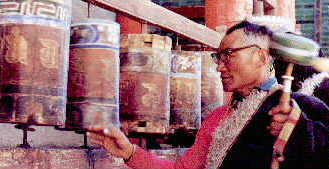remeber anatta = "no self" if there is no self there cannot be a reincarnation of selfSiddhartha Gautama in some of his previous lives was reincarnated as animals and lower life forms. That is really not that different than the Brahmanistic version of Samsara. My point is that Samsara sounds just as fantastical and illogical as Christian and Islamic views of salvation and liberation in a kingdom of God.
I personally believe all religious traditions are just different faces of an ultimate reality. We are just recently evolved smart chimpanzees, and our ranges of spiritual soteriology collectively just encompass our attempts to put a face on an ultimate reality. Therefore, while I personally feel the greatest affinity for the Christian tradition, I endeavor to adopt a posture that Christianity, and Christianity uniquely, is neither more correct nor more superior to other religious traditions
In fact the very idea of a permanent self while alive is nothing more then ego construct.
But it does get complicated - I consider myself (lol that word) a Tibetian Buddhist
after we die we go into realms and various states to reintegrate (samsara)
The Tibetan Book of the Dead
https://en.wikipedia.org/wiki/Bardo_Thodol
~~
most Buddhist go with the "wager argument - bypassing the philosophical constructs.
This is typically how Buddha reasoned out argument in his suttas as well
https://en.wikipedia.org/wiki/Rebirth_(Buddhism)
The Buddha's main pragmatic argument is that if one accepted his teachings, one would be likely to pay careful attention to one's actions, so as to do no harm. This in and of itself is a worthy activity regardless of whether the rest of the path was true. When applying this argument to the issue of rebirth and karmic results, the Buddha sometimes coupled it with a second pragmatic argument that resembles Pascal's wager: If one practices the Dhamma, one leads a blameless life in the here-and-now. Even if the afterlife and karmic results do not exist, one has not lost the wager, for the blamelessness of one's life is a reward in and of itself. If there is an afterlife with karmic results, then one has won a double reward: the blamelessness of one's life here and now, and the good rewards of one's actions in the afterlife. These two pragmatic arguments form the central message of this sutta.[71]
In the 1940s, J.G. Jennings interpreted the teaching of rebirth in a less than literal sense. Believing that the doctrine of anatta (not-self) is incompatible with the view that the actions of one individual can have repercussions for the same individual in a future life, Jennings argued that the doctrine of actual transmigration was an "Indian dogma" that was not part of the original teachings of the Buddha. However, rebirth could instead be understood as the recurrence of our selfish desires which could repeat themselves “in endless succeeding generations”. In this interpretation, our actions do have consequences beyond our present lives, but these are “collective not individual.”[74]
https://en.wikipedia.org/wiki/Rebirth_(Buddhism)
Last edited:


